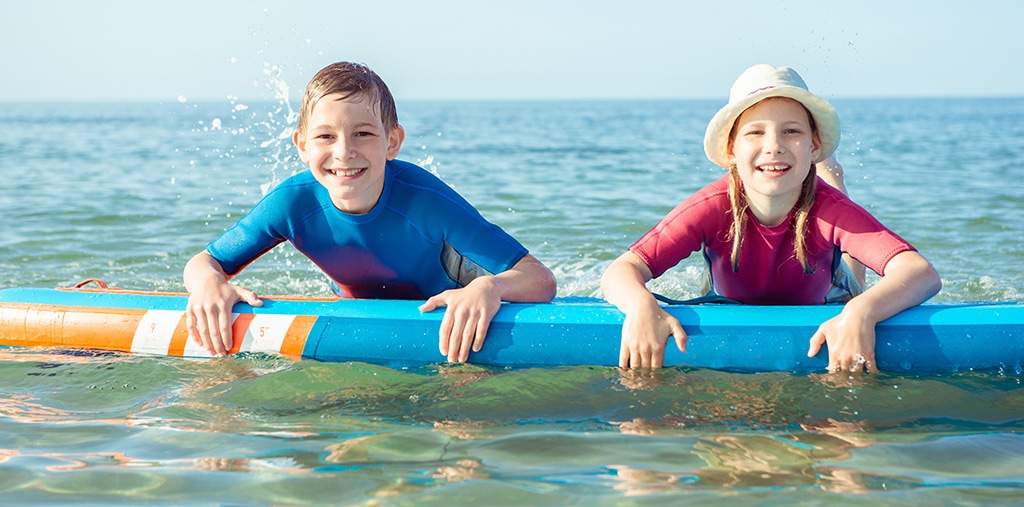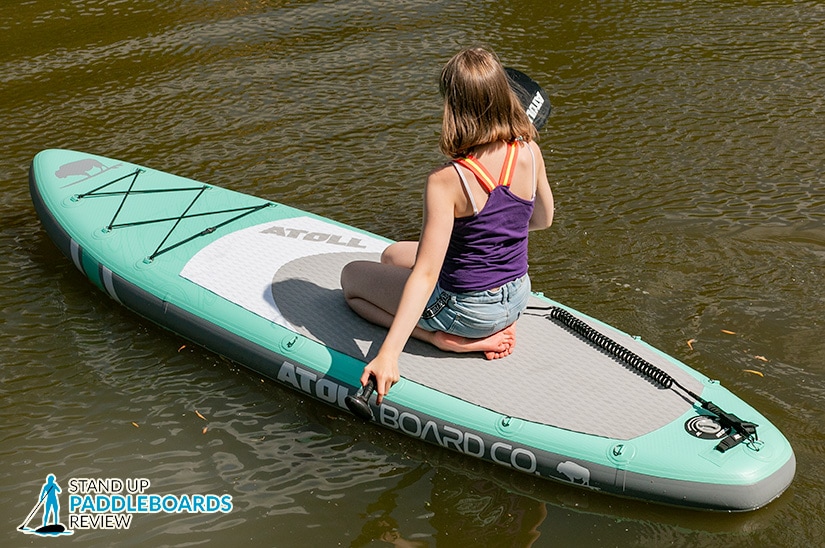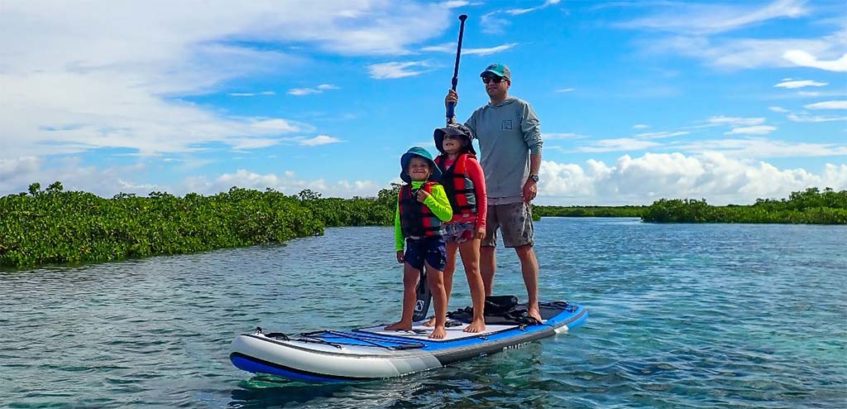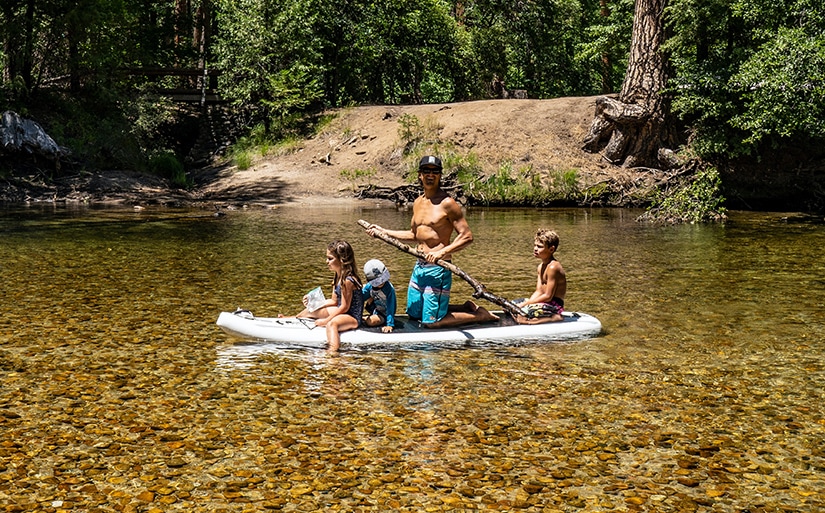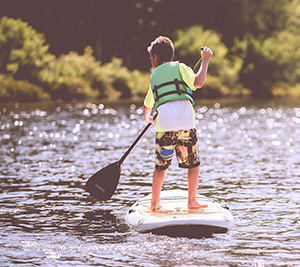While it might seem a little scary at first – and especially if you’ve never done it before – you can absolutely take a child on a paddle board. There is no set age, but of course common sense should prevail (it’s not a good idea to take a newborn onboard with you).
It all depends on you, your child, and your situation. Some kids can take to paddle boarding earlier than others, so it’s something that you’ll have to assess as a parent. Children as young as four can, under strict supervision, spend time on a paddle board – but it obviously depends on the child.
Can You Take a Child on a Paddle board?
Yes, you can take a child on a paddle board. The way you choose to introduce your child to paddle boarding will vary, depending on your child’s abilities. If they are a confident swimmer, you might want to introduce them to paddle boarding early (without being overly pushy, of course).
However, if your child isn’t a confident swimmer, it’s a better idea to introduce them to stand up paddle boarding in a way that is more manageable to them. They can sit on your paddle board with you on your next SUP outing – and ride with you until they feel confident enough to stand.
Alternatively, you might want to use a tandem SUP to get your child used to paddling for themselves, but without the stress of paddling solo.
Much like a tandem kayak, these types of us SUPs allow you to bring on a second passenger. It might be harder for you to paddle, but it will give your young passenger a nice introduction to the board without the intimidation of being alone.
Be sure to start on a shallow, calm body of water first, and of course wear the appropriate personal flotation devices. This will allow your child to get acclimated to the water, get comfortable on their board, and build confidence and eventually skill, all while feeling safe and more confident.
Tandem Paddling Before Solo Paddling
As I mentioned, tandem paddling can be a great option, especially for newbies and young kids. When you take along a child, you can teach them the skills they need first-hand. Tandem paddling will allow them to practice those skills in real time under the supervision of someone they trust.
When you start to feel like your child is building up in both skill and performance, you can move them over to solo paddle boarding. As with the rule previously mentioned, you’ll always want to paddle board in rather calm and shallow waters.
When your child falls off the board (and this will happen) shallow water gives them the added safety and comfort that everything is alright.
Can Kids Use an Adult Paddle board?
Kids can paddle on an adult size paddle board, but it might be a little bit uncomfortable or difficult for your child.
Because kids weigh less, they require less buoyancy to keep them afloat. Full-size adult paddle boards can accommodate an average of 200 to 250 pounds. As far as the safety in holding their weight goes, kids will be secure on an adult board.
For some kids, especially younger kids, it just feels better being on a child sized – or simply smaller sized – paddle board.
Larger boards can cause performance issues for smaller paddlers. If the board is too wide, the child may have a difficult time maneuvering their paddle to either side.
A bigger board might also cause them to have an uncomfortable stance and it might make them feel like they have less balance and control. This could make it even more difficult for a child who has no skill and is just getting started – which defeats the object, really.
What Size Paddle Board Do I Need for Kids?
So what is the right size board for a young child who wants to go paddle boarding? For the most part, you want to aim for a short, yet wide board. Inflatable SUPs are good options to go with, as they are more comfortable, with softer decks, and are lighter to carry around than solid SUPs.
If you have a small child, opt for a wide, short board as this will offer the best stability possible. Lengthwise, it’s best to use a board that is no longer than 9 ft.
Use a Stable Paddle Board With Your Child
Stability is one of the key skills needed for paddle boarding. Stability is something the paddler must bring, but it’s also a good feature to look for in a board.
As your child develops their skill, having a stable paddle board will help them along the way. There are a couple of different features of a board that lends well to a more stable board. Consider the following features when you’re shopping for a right sized paddle board for your child.
Thicker is Better
Opt for a paddle board that is 5 or 6 inches thick as opposed to 4 inches thick. The thickness will help with stability and will lessen how wobbly your child feels while on the board.
You’ll also want the thickness to be consistent throughout the entire width and length of the board. This means avoiding boards that offer tapered edges as these are geared towards paddlers looking for speed and maneuverability.
Inflatable SUPs typically offer a consistent thickness making them the best option to go with for a child.
Which is Better for Kids: Inflatable or Hard Shell Paddle Board?
If you’re going to purchase a paddle board for your child, then it’s best to stick with an inflatable paddle board. Inflatable paddle boards offer conveniences that hard boards simply do not.
We’ve talked a bit about how inflatables do a better job offering a thicker and more consistent thickness width wise. Let’s go over some other key advantages of opting for an inflatable over a hard shell paddle board.
- iSUPs are easier to transport – If you’re going out as a family, it can be cumbersome and difficult to find space to fit multiple paddle boards. Inflatables will help you eliminate this issue almost entirely, as most deflate down into a backpack
- Inflatables are lighter than hard SUPs – Inflatable paddle boards are also incredibly lightweight. Your child will be able to carry their paddle board on their own when they get in and out of the water.
- Inflatable SUPs are incredibly durable – a quality built inflatable SUP board is durable enough to withstand bumps and scrapes against rocks, rough edges and other paddlers. So kids can be confident they won’t damage their SUP while they practice.
Safety Is Key
As with any activity on the water, it’s important for your child to stay safe when they’re out paddling – and while they should be under your strict supervision – they (and you) should still also be adhering to proper safety precautions.
There’s a lot that your child can do to avoid danger even if they aren’t the most skilled paddle boarder.
Always Wear a Life Jacket
A paddle board life jacket will help keep your child protected when they do (and they will) fall off of their board. Even if your child is one of the most confident swimmers out there, it’s important that they wear a properly sized life vest.
For many kids, this isn’t even a matter of choice. Depending on your child’s age, and where you live, it’s usually the law that children age 12 and younger wear their vest. It’s important that your child’s safety vest is fitted for their size and appropriate for their type of skill level.
Bring Appropriate Safety Gear
In addition to a life jacket, it’s important that your child bring along additional safety gear. Recommended gear includes:
- A whistle
- A SUP leash
- Water in order to stay hydrated
- Proper sun protection such as sunscreen or a wetsuit
Practice Makes Perfect
When you go out paddle boarding with your child, it’s important to have realistic expectations. It will take some time and a lot of parental patience in order for your kids to get comfortable on the water. When they do, you will start to see your child progress as far as comfort and skill level goes.
While paddle boarding with kids of almost any age is pretty unpredictable, one thing is certain. Paddle boarding with your child is a great way to spend quality time with your family. The memories you will make as a whole family are certainly some of the best when it comes to adventures on the water.
So, What Age Can You Start Paddle Boarding Alone?
There is no one size fits all answer to this question. Some kids can begin paddle boarding at a young age, even as young as four or five years old. Other kids might be better off waiting a few more years until they feel more confident. It depends on the child and their situation.
It is up to the parents or guardians to ensure that their kids start paddle boarding only when they are ready, and that they have the correct knowledge, confidence, and safety gear to be able to paddle safely.

